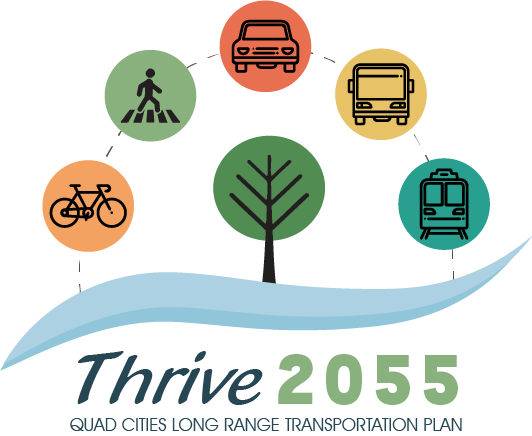- Details
- Written by: Sarah Grabowski
- Category: Transferred From Old Site
- Hits: 6117
March 23, 2016 – Denise Bulat, Executive Director, presented the final draft sections of the Bi-State Region Comprehensive Economic Development Strategy (CEDS) 2016. The sections presented included the executive summary, analysis of regional economy, strategic direction and performance measures, and projects lists from the Bi-State Region.
- Details
- Written by: Sarah Grabowski
- Category: Transferred From Old Site
- Hits: 6241
March 23, 2016 – Bi-State Regional Commission adopted the 2045 Quad Cities Long Range Transportation Plan on March 23, 2016. Five informational public meetings held drew 37 attendees and 232 website views. Public comments focused on transit improvements, pavement maintenance and completion of projects—such as the Mississippi River Trail— passenger rail service between Chicago and Quad Cities, and reconstruction of the I-74 Mississippi River Corridor.
- Details
- Written by: Sarah Grabowski
- Category: Transferred From Old Site
- Hits: 4021

- Details
- Written by: Sarah Grabowski
- Category: Transferred From Old Site
- Hits: 5776
February 24, 2016 – Laura Berkley, Senior Planner, provided more information on the 2016 Comprehensive Economic Development Strategy (CEDS) full update. The CEDS is redeveloped every five years. The CEDS must be completed for the region to receive federal funds from the Economic Development Administration (EDA).
- Details
- Written by: Sarah Grabowski
- Category: Transferred From Old Site
- Hits: 4080

- Details
- Written by: Sarah Grabowski
- Category: Transferred From Old Site
- Hits: 7342
February 24, 2016 – The 2016 Community Development Block Grant (CDBG) competitive Public Infrastructure and Housing Rehabilitation grant applications are due on September 29, 2016.
Funds are available on an annual basis by the U.S. Department of Housing & Urban Development (HUD) and administered by Illinois Department of Commerce and Economic Opportunity (DCEO). Public Infrastructure grants are utilized to assist low-to-moderate income communities to improve public infrastructure and eliminate conditions detrimental to public health, safety, and public welfare. Funding priority is given to water and sanitary and storm sewer projects. Eligible applicants must have a low-to-moderate income above 51% either community-wide or in a selected target area. Income surveys can be distributed to determine the low-to-moderate income percentage. Awarded applicants may receive up to $450,000.
- Details
- Written by: Sarah Grabowski
- Category: Transferred From Old Site
- Hits: 6143
 February 1, 2016 – We are pleased to announce that QCTrails.org was launched this week. The new website is a comprehensive resource showing the trails in the Quad Cities Area, along with landmarks, points of interest, infrastructure, and other valuable resources such as parking, water, restrooms, information kiosks, parks, etc. The staff at Bi-State Regional Commission teamed up with Quad City Health Initiative (QCHI) and other local partners to create the interactive trails map and website. Funding for the project is from the Partnerships to Improve Community Health grant through the Centers for Disease Control and Prevention (CDC). Visitors to the website can find trails and learn more about encouraging and improving local outdoor physical activity throughout the year. In the “Log My Trails” area, users can create their own account, which allows them to save favorite trails, make wishlists, add photos, comments, and notes on trails. In addition, completing trails lets user earn 16 badges to showcase their achievements. Go to QCTrails.org and check it out today!
February 1, 2016 – We are pleased to announce that QCTrails.org was launched this week. The new website is a comprehensive resource showing the trails in the Quad Cities Area, along with landmarks, points of interest, infrastructure, and other valuable resources such as parking, water, restrooms, information kiosks, parks, etc. The staff at Bi-State Regional Commission teamed up with Quad City Health Initiative (QCHI) and other local partners to create the interactive trails map and website. Funding for the project is from the Partnerships to Improve Community Health grant through the Centers for Disease Control and Prevention (CDC). Visitors to the website can find trails and learn more about encouraging and improving local outdoor physical activity throughout the year. In the “Log My Trails” area, users can create their own account, which allows them to save favorite trails, make wishlists, add photos, comments, and notes on trails. In addition, completing trails lets user earn 16 badges to showcase their achievements. Go to QCTrails.org and check it out today!
- Details
- Written by: Sarah Grabowski
- Category: Transferred From Old Site
- Hits: 6287
January 27, 2016 – The Transportation Policy Committee concurred on initiating the public review process for the 2045 Quad Cities Long Range Transportation Plan (LRTP). Under the Committee’s direction in concert with the Transportation Technical Committee, Bi-State staff have worked for the last 4 years on the plan update. The update is a federal requirement as part of the transportation planning process of the Metropolitan Planning Organization (MPO), which is Bi-State Regional Commission. Five public input meetings are being scheduled for mid-February to roll out the draft plan. The Policy Committee will make a final recommendation to the Bi-State Regional Commission board for approval at their March 2016 meeting.
- Details
- Written by: Sarah Grabowski
- Category: Transferred From Old Site
- Hits: 6085
January 27, 2016 – Laura Berkley, Senior Planner, provided a brief update on the status of the 2016 Comprehensive Economic Development Strategy (CEDS) – full update. The CEDS is redeveloped every five years. The CEDS must be completed for the region to receive federal funds from the Economic Development Administration (EDA).
The CEDS planning process is a collaborative effort with participation from local governments, economic development organizations, institutions of higher learning, and private businesses. In order to ensure full representation of the region, meetings have been held in each county. A core Bi-State staff of five works closely on the document while another five provide information and review. The CEDS also serves as a unifying economic development strategy that broadly incorporates goals and projects from across the region.
- Details
- Written by: Sarah Grabowski
- Category: Transferred From Old Site
- Hits: 6973
December 16, 2015 – The highest elected official or other administrative staff in your community may have recently received a correspondence from the U.S. Census Bureau related to the Boundary and Annexation Survey (BAS) Program. This is an important opportunity for your community to ensure that its boundaries are correct in the Census Bureau files. The Census Bureau uses the boundary information collected in the BAS to tabulate data for the decennial and economic censuses, and annual estimates and surveys such as the Population Estimates Program and the American Community Survey. More information is available in the handout below. For assistance in navigating this program, please contact Lisa J. Miller, Data/GIS Director, (309) 793-6302, extension 133 or


